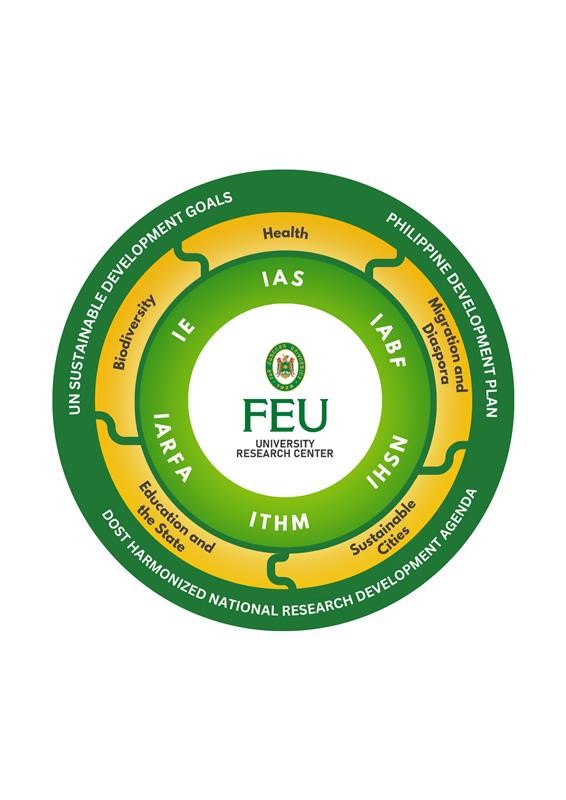URC Vision Statement
The University Research Center (URC) envisions to be recognized as one of the progressive research hubs in the country that focuses on advancing cultural and real-world solutions through sustainable and scientific research.
URC Mission Statement
The University Research Center (URC) is a unit that oversees the research programs and creative works of the University that primarily focuses on the creation of relevant and high-quality research that responds to the pressing issues of society.
URC aims to strengthen the culture of research through engaging, productive, and meaningful collaboration in partnership with the FEU community and other research institutions through innovative knowledge generation that contribute to the development of the Philippine and global societies.
Objectives
In the pursuit of the vision and mission, the URC commits to:
- Provide support and opportunities for discussing, disseminating, and/or commercializing research outcomes and innovations.
- Implement the university research agenda which focuses on the 5-priority research initiatives, policies, and guidelines to strengthen research and creative works culture through increased productivity.
- Manage research and creative works centers and committees that regulate productivity and quality of projects.
- Organize interdisciplinary research teams addressing the UN, DOST HNRDA, and PDP priority areas.
- Collaborate with the institutes, offices, and units to actualize the university and institutes’ research agenda.
- Establish, expand, and sustain external partnerships and resources.
- Strengthen the capacity of researchers and scholars through capacity-building programs and other research-related activities.
Moral Principles
The University Research Center (URC) is committed to upholding the following moral principles:
- Uplift – Uplifting the community by creating a culture of research
- Respect – Respecting the diversity of the researcher’s backgrounds, identities, and perspectives
- Collaboration – Nurture a culture of teamwork and collaboration in academic research
The URC is dedicated to empowering the institutes and FEU community by providing comprehensive support through grants, incentives, and research capacity building programs with the aim of achieving the 5-priority research initiatives of the university.
Furthermore, it commits itself to collaborate with government agencies, private and non-government organizations as it works across institutes and universities to achieve global and sustainable real-world solutions through research and creative works.
Priority Impact Research Initiatives (PIRI)
The following topics are identified as the 5-priority research of the university. This also includes the overview and preliminary list of topics for each research initiative (Download PIRI Presentation):
- Fostering Biodiversity Across a Changing Landscape
- Communicable Diseases Transmitted from Animals to Humans (Zoontic Diseases)
- Filipino Diaspora and the Homeland: Leaving, Staying Behind, and In-Between
- History and the Sustainable City: How Cities Have Developed and How They Will Develop
- In PIRI- From Directive to Practice: How Teaching and Learning Happens Throughout the Philippines in Response to CMOs, DMs, and DOs
Figure 1. FEU URC Research Agenda Framework
To actualize the 5-priority research initiatives, the university developed a research agenda framework that served as a guide for the identified research topics.

This framework emphasizes the interconnectivity between institutes at Far Eastern University (FEU) by facilitating interdisciplinary and collaborative research projects aligned with the 5-Priority Impact Research Initiatives (PIRI).
Furthermore, the University Research Center (URC) acknowledges the harmonious relationship between the United Nations Sustainable Development Goals (UN-SDGs), the Philippine Development Plan (PDP), and the Department of Science and Technology’s Health and Nutrition Research and Development Agenda (DOST-HNRDA) by integrating these goals into its research endeavors as part of the Aspiration 2028.
Recognizing the inherent complexity of contemporary societal challenges, URC underscores the necessity of interdisciplinary collaboration. Consequently, the university is committed to fostering collaborative partnerships with both governmental and non-governmental agencies. Through such collaborative efforts across institutes and universities, the University Research Center (URC) strives to develop impactful, sustainable, and globally relevant solutions to pressing social issues.
Research Manuals
Research Fellows
Rommel L. Bunuan
Institute of Education
Maria Rita R. Cucio
Institute of Arts and Sciences – Political Science
Flordeliza F. Francisco
Institute of Arts and Sciences – Mathematics
Maria Theresa M. Rivera
Institute of Arts and Sciences – Communication
Sandra L. Yap
Institute of Arts and Sciences – Biology
Pauline Grace Basilia
Institute of Arts and Sciences – Interdisciplinary Studies
Joy Sheelah Baraero Era
Institute of Tourism and Hotel Management
Shiela Marie Hocson
Institute of Arts and Sciences – Psychology
Rosarito T. Suatengco
Institute of Education
Hyunkyung Lee
Institute of Education